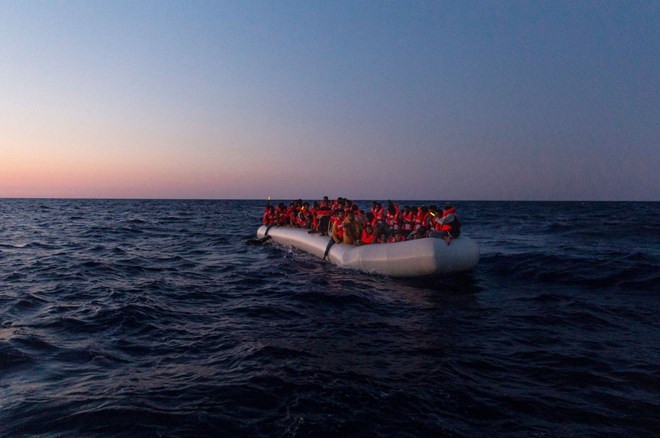
Tuesday July 4, 2023

A Sea-Watch 3 crew member on a lifeboat approaches an inflatable boat with 120 people on board in the central Mediterranean, July 23, 2022. (Handout by Sea-Watch AFP Photo)
The Türkiye representative of the United Nations High Commissioner for Refugees (UNHCR), Philippe Leclerc, called on the European Union to firmly place safety and solidarity at the forefront of their actions in the wake of the June 14 shipwreck off the coast of Greece.
"The EU, its member states, and all countries bordering the Mediterranean Sea must prioritize safety and solidarity as the driving forces behind their actions in the region," Leclerc told Anadolu Agency (AA).
"In view of the increased movements of refugees and migrants in the Mediterranean, collective efforts, including greater coordination between all Mediterranean States, solidarity and responsibility-sharing, as reflected in the EU's Pact on Migration and Asylum are essential to save lives," Leclerc added.
"This includes the establishment of an agreed regional disembarkation and redistribution mechanism for people who arrive by sea, which we continue to advocate for," he said.
Noting that by the end of 2022, the number of people displaced by war, persecution, violence and human rights abuses stood at a record 108.4 million, up 19.1 million from a year earlier, Leclerc said that this "was the largest ever increase."
"It includes 35.3 million refugees, 62.5 million internally displaced people, 5.4 million asylum seekers and 5.2 million other people in need of international protection," he added.
Supporting Türkiye criticalNoting that since 2014, Türkiye has been hosting the world's largest refugee population, with "some 4 million refugees and asylum seekers benefiting from a sound legislative framework," he said. "Continuing to support Türkiye is more critical than ever."
"We need to continue supporting the immediate and continued humanitarian needs of people affected by the earthquake while engaging in early recovery, reconstruction and development activities for people to rebuild their lives," he added.
Leclerc also called on the international community "to show the people of Türkiye the same kind of support and generosity with which they received, protected and assisted millions of refugees in an enormous show of solidarity in line with the Global Compact on Refugees" in the face of the Feb. 6 major earthquakes, which killed more than 50,000 people.
Leclerc said that while low- and middle-income countries hosted 76% of the world's refugees and others needing international protection, the least developed countries provided asylum to 20% of the total.
"High-income countries, which account for most of the global wealth, hosted 24% of refugees at the end of 2022," he said. "This is a much greater proportion than in recent years due primarily to the number of Ukrainian refugees hosted in high-income, mainly European countries."
The UNHCR official said that the Global Compact on Refugees, affirmed by the U.N. General Assembly in 2018, presents a blueprint for the global solidarity and responsibility sharing needed by the international community.
"This means doing more to ease the pressure on the host countries, enhance refugee self-reliance, expand access to third-country solutions, and support conditions in countries of origin for voluntary return in safety and dignity," he said.
"The forthcoming Global Refugee Forum 2023 will be an opportunity to demonstrate that this solidarity remains solid, as states and other stakeholders showcase good practices and make new commitments to support refugees and their host communities," he added.
Asked about the EU countries' different responses to Syrian and Ukrainian refugees, Leclerc said: "We have always advocated for access to asylum for all refugees and have made our positions clear, publicly and with governments."
"Respecting human rights is not a choice – it is a legal and moral obligation," he said.
"Regional and neighboring countries of those affected by conflict welcome the largest numbers of refugees. That's normal," he added.
"Countries neighboring Sudan have received those fleeing the crisis there this year. Countries next to Syria, including Türkiye, have hosted Syrian refugees for over a decade; Kenya and other countries across the African continent continue to protect Somalis; Bangladesh hosts hundreds of thousands of Rohingyas, and so on," Leclerc said.
"On the other hand – we also say to Europe and all countries – accept asylum claims on merit, not on nationality or how one arrives," he said.